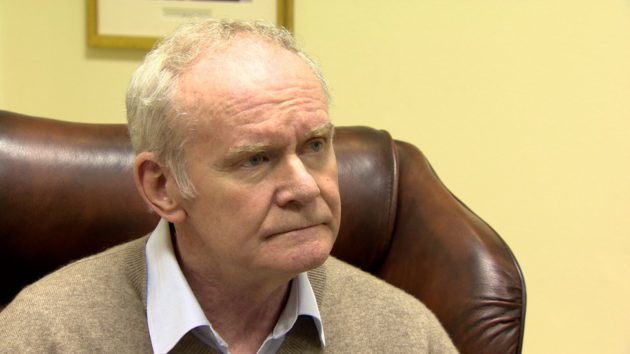Martin McGuinness, ex leader dell’IRA divenuto pacificatore, ha confermato che non parteciperà alla prossima tornata elettorale per l’Assemblea di Stormont
Martin McGuinness si è dimesso dal ruolo di vice primo ministro dopo lo scandalo sullo schema di energia pulita, che porterà alle prossime elezioni del 2 marzo.
McGuinness era vice primo ministro sin dall’instaurazione del nuovo governo condiviso con gli altri partiti politici, insediatosi nel 2007 sotto la guida dell’ex nemico politico Ian Paisley.
Martin McGuinness, 66 anni, è malato da settimane e questo è stato un fattore determinante nella sua decisione.
Ha riferito alla BBC che ha dovuto affrontare “una grande decisione” sul proprio futuro e che non sarà più “un rappresentante eletto” nella politica.
“Mi sono chiesto: sei in grado, fisicamente, di lottare in queste elezioni con l’intensità necessaria?
“E la risposta onesta è che non sono in grado di farlo, quindi non sarò uno dei candidati”.
Ha aggiunto che il suo successore alla guida dello Sinn Féin in Irlanda del Nord sarà annunciato “settimana prossima”.
Poli opposti
Il primo ministro inglese Theresa May ha detto che Martin McGuinness “ha giocato un ruolo fondamentale nello spostamento del movimento repubblicano verso l’utilizzo di mezzi pacifici e democratici”.
“Voglio inviargli i miei migliori auguri per il suo ritiro” ha aggiunto. “Continueremo tutti a lavorare per essere sicuri che la popolazione dell’Irlanda del Nord sia in grado di vivere liberamente e in pace”.
Arlene Foster, leader del Democratic Unionist Party (DUP) che ha perso il posto di primo ministro nordirlandese dopo le dimissioni di Martin McGuinness, ha detto che il repubblicano è stato “una figura importante” a Stormont.
“Senza mai dimenticare il passato, credo che il lavoro a Stormont abbia fornito le basi per la nostra pace odierna.
“Nonostante tutto quello che è successo, auguro a Martin McGuinness una pronta guarigione e che lui e sua moglie siano in grado di godere del tempo insieme alla loro famiglia, lontano dal fuoco incessante della vita pubblica”.
L’ex primo ministro Peter Robinson, che ha lavorato con McGuinness guidando il governo dell’Irlanda del Nord per sette anni, ha detto: “Siamo venuti da ambienti opposti ma abbiamo costruito un rapporto basato sul fare del nostro meglio per tutta la nostra gente”.
Il Taoiseach (primo ministro irlandese) Enda Kenny ha detto che mentre lui e McGuinness “non sono sempre stati d’accordo su ogni questione” ha comunque “prontamente riconosciuto il notevole percorso politico che ha intrapreso”.
James Brokenshire, segretario di Stato per l’Irlanda del Nord,e si è detto “dispiaciuto” per la decisione McGuinness.
Lo Sinn Féin non ha mai riferito dettagli sulle condizioni di salute di Martin McGuinness ma RTE – il canale pubblico irlandese – ha riferito che il politico soffre di una rara malattia cardiaca.
Tratto da BBC News
Martin McGuinness: Ex-deputy first minister will not stand in NI election
Martin McGuinness, former IRA leader turned peacemaker, has confirmed he will not stand in the Northern Ireland Assembly election.
He quit as deputy first minister in a row over a botched green energy scheme, sparking an election on 2 March.
He had been in the post since entering NI’s power-sharing assembly in 2007 with ex-political enemy Ian Paisley.
Mr McGuinness, 66, has been ill for a number of weeks and said this was a factor in his decision.
Mr McGuinness told the BBC that he had faced a “big decision” over his future and that he will never again be “an elected representative” in politics.
“The question I ask myself is: Are you capable, are you physically capable, of fighting this election with the intensity that elections need to be fought?
“And the honest answer is that I am not physically capable or able to fight this election, so I will not be a candidate.”
He added that his successor as Sinn Féin’s leader in Northern Ireland would be announced “next week”.
‘Polar opposite backgrounds’
Prime Minister Theresa May said Mr McGuinness “played a key role in moving the republican movement towards a position of using peaceful and democratic means”.
“I want to send him best wishes for his retirement,” she added. “We will all continue to work to make sure that the people of Northern Ireland are able to live freely and in peace.”
Democratic Unionist Party (DUP) leader Arlene Foster, who lost her position as first minister when Mr McGuinness resigned, said that he had been a “major figure” in Stormont.
“While never forgetting the past, I believe the work at Stormont provided the foundations for our relative peace today.
“Despite all that has happened, I wish Martin McGuinness a speedy recovery and that he and his wife are able to enjoy time with their family away from the relentless focus of public life.”
Former first minister Peter Robinson, who worked with Mr McGuinness at the head of Northern Ireland’s government for seven years, said: “We came from polar opposite backgrounds but built up a relationship based on doing the best we could for all our people.”
Taoiseach (Irish prime minister) Enda Kenny said that while he and Mr McGuinness “may not always have seen eye-to-eye on every issue” he would “readily acknowledge the remarkable political journey that he has undertaken”.
Northern Ireland Secretary of State James Brokenshire said he was “sorry to hear” about Mr McGuinness’ decision.
Details of Mr McGuinness’ condition have not been disclosed officially by Sinn Féin but Irish national broadcaster RTÉ has reported that he has a rare heart condition.
